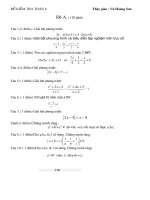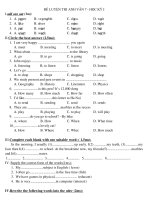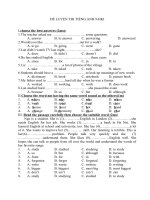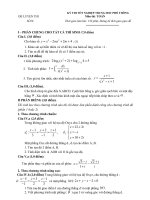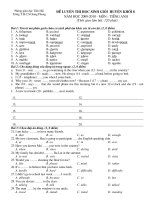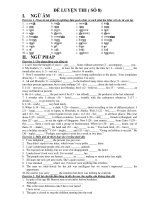- Trang chủ >>
- Đề thi >>
- Đề thi lớp 8
ĐỀ LUYỆN THI ANH 8 (16)
Bạn đang xem bản rút gọn của tài liệu. Xem và tải ngay bản đầy đủ của tài liệu tại đây (146.77 KB, 13 trang )
unit 16: INVENTIONS
TEST 1
I. Choose the word that has the underlined part pronounced differently from the
others.
1. a. papyrus
2. a. ferment
3. a. think
4. a. teacher
5. a. machine
b. appliance
b. delicious
b. grind
b. 1oudspeaker
b. chocolate
c. vacuum
c. shell
c. chip
c. heavy
c. touch
d. marine
d. invention
d. mix
d. bean
d. kitchen
II. Choose the word or phrase that best completes each unfinished sentence
below or substitutes for the underlined word or phrase.
6. The facsimile _____ by Alexander Bain in 1843.
a. is invented b. was
invented
c. invented d. has
been invented
7. First fry the onions______, add the potatoes.
a. than b. then
c. after d. before
8. He______a prize in the competition.
a. win b. won
c. was won d. has win
9. Who the company?
a. goes b. walks
c. jogs d. runs
10. ______ is an instrument for making sounds louder.
a. Loudspeaker b. Recorder c. Facsimile
d. Radio
11. The doctor told me _____ more fresh fruit.
a. eat b. to eat
c. eating d. ate
12. Can you repair my bike?
a. fix b. use
c. adjust d. a&b
13. Coffee was known in Europe_______’Arabian wine’.
a. as b. like
c. was d. Ø
14. The information ______.
a. stores b. stored
c. is stored d. ate stored
15. I saw a _____ flying overhead.
a. train b. helicopter
c. conveyor belt d. coach
III. Choose the words or phrases that are not correct in Standard English.
16. The rice grains is husked in the mill to produce brown rice.
A B C D
17. Don’t forget to turn out the lights before leaving the building.
A B C D
18. Follow I and I will show you the way.
A B C D
19. The coffee berries fermented in water for make a strong tasting liquid.
A B C D
20. Ann wanted to know where in order to get a map of the city.
A B C D
IV. Choose the word (a, b, c, or d) that best fits each of the blank spaces.
Milk is produced (21)____farms from cows. (22)___ , the cows are milked. This
(23)_____happens twice a day, using a milk machine. Then, the milk is cooled and
stored in large, refrigerated containers. Next, the milk is collected and delivered to
the dairy. (24)_____, at the diary, milk is made into various products
(25)_____cheese, cream, butter and liquid milk for drinking. Finally, these are
(26)_____to supermarkets and shops.
21. a. in b. at
c. on d. by
22. a. First b. Firstly c. Next
d. a & b
23. a. lately b. usually c. recently
d. finally
24. a. Although b. After that c. However
d. Finally
25. a. including b. included c. such as
d. a & c
26. a. deliver b. delivering c. delivered
d. delivery
V. Read the following passage and choose the item (a, b, c, or d) that best
answers each of the questions about it.
Coca Cola is enjoyed all over the world. 1.6 billion gallons are sold every year, in
over one hundred and sixty countries. The drink was in vented by Dr John Pemberton
in Atlanta, on 8 May 1886, but it was given the name Coca-Cola by his partner, Frank
Robinson. In the first year, only nine drinks a day were sold. The business was
bought by a man called Asa Candler in 188, and the first factory was opened in
Dallas, Texas, in 1895. Coca-cola is still made there. Billions of bottles and cans have
been produced since 1895.
27. The one who invented Coca Cola was______.
a. Dr John Pemberton b. Frank Robinson
c. Asa Candler d.
Dallas
28. What does the word ‘it’ in line 3 refer to?
a. the world b. gallon c.
country. d. the drink
29. The first Coca Cola company was open______.
a. in 1886 b. in 1888 c. in
1895 d. since 1895
30. Nowadays, Coca Cola is sold______.
a. all over the world b. in
more than 160 countries
c. everywhere
d. all are correct
31. Which of the following is not true?
a. Every year, 1.6 billion gallons of Coca Cola are sold.
b. Coca-Cola is still produced in Dallas.
c. Nowadays, people don’t want to buy Coca-Cola any more.
d. At first, people didn’t like Coca-Cola very much.
TEST 2
I.Choose the word that has the underlined part pronounced differently from the
others.
1.a. behave b. paper c.
taste d. chocolate
2.a. refine b. invent c.
facsimile d. vanilla
3.a. button b. crush c.
pulp d. papyrus
4.a. touch b. thousand c. about
d. round
5.a. process b. appliance c. official
d. place
II.Choose the word or phrase that best completes each unfinished sentence
below or substitutes for the underlined word or phrase.
6.The rice crop______.
a. is harvesting b. are harvesting c. is harvested d.
are harvested
7.We had dinner_____did the washing - up.
a. and then b. and after c. and
finally d. and lately
8.We delayed our trip due to the bad weather.
a. because b. because of c.
therefore d. however
9.The______machine has a lot of rollers.
a. papermaking b. rnakingpaper c. papermake
d. papermade
10.Tell him_____.
a. wait b. to wait
c. waiting d. waits
11.At one time, coffee_____as a medicine.
a. used b. was usnd to c.
was used d. uses
12._____is a machine that washes dishes.
a. Washing machine b. Dishwasher c. Microwave d.
Hairdryer
13.Jack doesn’t know how_____the toaster.
a. fix b. to fix
c. fixing d. for fixing
14. This food tastes______.
a. delicious b. wonder c.
diliciously d. wonderfully
15. She reheated the soup in the _____.
a. microwave b. hairdryer c.
microphone d. vonveyor belt
III. Choose the words or phrases that are not correct in Standard English.
16. A sample of chocolate given after visitors have toured the factory.
A B C D
17. In the morning, the Professor showed us up the university.
A B C D
18. After met the movie star, I understood why she was so popular.
A B C D
19. One quarter to one third of the world’s coffee are produced by Brazil.
A B C D
20. The procedure is almost the same like it was 200 years ago.
A B C D
IV. Choose the word (a, b, c, or d) that best fits each of the blank spaces.
Sugar cane is grown in hot countries like Cuba and the West Indies, where there is
a heavy rainfall. At (21) ________ time, the cane is cut as close to the ground as
possible in (22)_____ to keep all the juice, or sap, in each long stalk.
Then, the cane (23)_____to a mill, where it is cut into a lot of small pieces. Next,
the juice is squeezed out by heavy (24)_____. The juice is cleaned and (25)____.
boiled until crystals appear. (26)_____, these brown crystals are separated from the
juice. The brown crystals are raw sugar.
21. a. harvest b. festival c.
event d. occasion
22. a. ought b. order c.
have d. need
23. a. takes b. is taking c.
is taken d. will take
24. a. rollers b. conveyors c.
buttons. d. molds
25. a. next b. then
c. since d. after
26. a. Although b. Finally c. After
that d. b&c
V. Read the following passage and choose the item (a, b, c, or d) that best
answers each of the questions about it.
NYLON was invented in the early 1930s by an American chemist, Julian Hill.
Other scientists worked with his invention and finally on 27 October 1938, Nylon
was introduced to the world. It was cheap and strong and immediately became
successful, especially in the making of ladies’ stocking.
Today, nylon is found in many things: carpets, ropes, seat belts, furniture,
computers, and even spare parts of the human body. It has played an important part in
our byes for over 50 years.
27. Julian Hill was a! an _____.
a. chemist b. Americai c.
inventor d. all are correct
28. Nylon can be found in ____.
a. many things b. spare parts
of the human body
c. furniture d. all are
correct
29. What does the word ‘introduce’ in line 3 ffiean?
a. tell somebody your name b. tell somebody the name of a person
c. bring in something new d. bring something somewhere
30. Nylon_____.
a. was invented by Julian Hill b. was strong but expensive
c. was not very popular d. all are correct
31. Which of the following is not true?
a. Nylon was used to make ladies’ stocking.
b. Today, Nylon still plays an important part in our lives.
c. At first, people didn’t want to use Nylon.
d. We can found Nylon in computers.
TEST 3
I. Choose the word whose main stress is placed differently from the others.
1. a. toaster b. fiber c.
zipper d. defrost
2. a. cocoa b. concrete c. remove
d. process
3. a. vanilla b. intention c. utensil
d. liquefy
4. a. papyrus b. microwave c. hairdryer
d. instrument
5. a. ingredient b. chemically c. facsimile
d. development
II. Choose the word or phrase that best completes each unfinished sentence
below or substitutes for the underlined word or phrase.
6. All her letters_____by her secretary.
a. is typed b. were typed c. is typped
d. were typped
7. First Lewis will give a TV interview, comes the main news conference.
a. Then b. Soon c.
After d. Behind
8. Please taste the soup and tell me if it needs more salt.
a. eat or drink a little of something
b. give a certain feeling when you put it in your mouth
c. use your teeth to make food soft
d. drink something slowly, taking only a little each time
9. Wine is made_____grapes.
a. in b. off
c. from d. into
10. _____ is a tall plant with big yellow seeds that
a. Maize b. Papyrus c. Cacao
d. Sugar cane
11. What do you think this button is____?
a. so that b. for
c. to d. in oder to
12. We stayed home _____ the cold weather.
a. because b. due to c.
therefore d. when
13. I was tongue-tied. I didn’t know what
a. say b. to say c.
to be said d. for saying
14. The man looks_____.
a. angry b. happiness c.
angrily d. happily
15. This ordinary-looking sofa can be made_____a bed.
a. in b. into c.
for d. to
II. Choose the words or phrases that are not correct in Standard English.
16. The bicycle has been invented by Karl D. Sauerbronn in 1816
A B C D
17. Mix yellow and blue to make green.
A B C D
18. After invented the light bulb, Thomas Edison went on to create
A B
many other useful inventions.
C D
19. The music was very loud and could hear from a long way away.
A B C D
20. Thanh Ha School closed for two days last week because a flood.
A B C D
III. Choose the, word (a, b, c, or d) that best fits each of the blank spaces.
Chocolate is made from up to 12 different types of cocoa (21)____. First, the beans
are sorted by hand before being (22)__. Each type of bean (23)___roasted separately.
Next, the shells of the beans are (24)_____. After this, the beans are mashed into a
thick paste and sugar and vanilla are added. This paste is called the ‘chocolate
liquor’. Then the chocolate (25) _____ is heated for up to 72 hours. Following this,
the liquor is repeatedly heated and then cooled (26)___several hours.
(27)___, the chocolate is allowed to cool and harden before (28)___packaged.
21. a. beans b. peas c.
plants d. fruits
22. a. roast b. roasts c.
roasting d. roasted
23. a. is b. are
c. was d. were
24. a.removed b. invented c. stirred
d. poured
25.a.liquor b.candy
c.powder d. flavor
26.a.on b.at
c.of d. for
27.a.Daily b.Hardly
c.Finally d. Nearly
28.a.be b.being
c.to being d.ø
IV. Read the following passage and choose the item (a, b, c, or d) that best
answers each of the questions about it.
Papyrus was made from the papyrus reed that grew near the Nile. First, strips of
papyrus reed were laid side by side on a large tray. Other strips of reed were then put
across these strips. The tray that contained the reeds was then covered with water to
help the reeds to stick together. After the strips were stuck in this way, the sheet of
papyrus was beaten with a hammer and left to dry in the sun. Finally, the sheet of
papyrus was poiished with ivory or a smooth shell in order to remove any roughness.
tray (n) cái khay beat (v) đập, nện
hammer (n) cái búa ivory (n) ngà (voi, v.v.)
smooth (adj) nhẵn mịn roughness (n) sự xù xì
29. Which of the following could be the best title of the passage?
a. How Paper is Made b. How to
Grow Papyrus Reed
c. How to Make Papyrus d. Where did Papyrus
Reed Grow?
30. What does the word ‘help’ in line 4 mean?
a. do something useful for somebody b. make something easier c. do something for
somebody d.
let somebody do something
31. Water was used to ______.
a. cover the tray that contained the reeds
b. help the reeds to stick together
c. to polish sheets of papyrus
d. a & b are correct
32. We can replace ‘in order to’ in line 7 with _____.
a. ‘to’ b. ‘so that’ c, ‘so as to’
d. a&c are correct
33. Which of the following is not true?
a. People used ivory to polish sheets of papyrus.
b. Sheets of papyrus didn’t have to be beaten with
c. Sheets of papyrus were left to dry in the sun.
d. Papyrus was a kind of paper.
TEST 4
I. Choose the word that has the underlined differently from the others.
1. a. vanilla b. vacuum c. add
d. facsimile
2. a. whiten b. fiber c.
zipper d. conveyor
3. a. remove b. wrote c.
mold d. cocoa
4. a. follow b. powder c. show
d. borrow
5. a. procedure b. thousand c. wood
d. hairdryer
II. Choose the word or phrase that best completes each unfinished sentence
below or substitutes for the underlined word or phrase.
6. This beautiful picture_____by Mary.
a. is drawn b. is drew c. is
draw d. is drawing
7. Don’t touch the paint - it’s still wet.
a. put your hand or finger on something
b. take something
c. do a job with something
d. put paint on something to change the color
8. I warned him ______ too close to the fire.
a. not to go b. not going c. no going
d. didn’t go
9. _____ is a pen that has a very small bll at the end.
a. Ball-point pen b. Fountain pen c. Pencil d.
Crayon
10. Tobacco is taxed in most countries, along with alcohol.
a. in the same way as something b. but not something
c. for example
d. including
11. James picked up the ____ and said “Hello.”
a. telephone b. printer c.
vacuum d. fax machine
12. Children, please behave!
a. do and say the right things b. do something
c. do what somebody tells you to do d. move on your legs, but not run
13. We now toast bread _____ a toaster on the table.
a. by b. with
c. from d. in
14. Which _____ do I press to turn the radio on?
a. button b. roll
c. roller d. plug
15. Don’t sit_____the sun too long.
a. iP b. on
c. over d. amongst
III. Choose the words or phrases that are not correct in Standard English.
16. She removed the dirty dishes off the table.
A B C D
17. Lou showed her up the nearby castle and country houses.
A B C D
18. Bicycle has been invented by a German inventor in 1816.
A B C D
19. The water in most rivers is unsafe to drink, due to it is polluted.
A B C D
20. He was awarded first prize in the written competition.
A B C D
IV. Choose the word (a, b, c, or d) that best fits each of the blank spaces.
An American called Thomas Alva Edison (21)___the first man (22)___sound. In
1878, he invented a machine (23)____a phonograph. The phonograph was a bit
(24)___a record player, but it used metal cylinders (25)____discs. Flat discs (records)
appeared ten years (26)____.
Tape recorders first appeared (27)_____the 1930s, but they were large and
expensive. Then, in 1963, the Philips Company developed the first cassette. Cassettes
are still very popular all (28)_____the world.
21. a. is b. was
c. to be d. a & b
22. a. record b. to record c. recording
d. for recording
23. a. called b. was called c. calling
d. was calling
24. a. like b. the same c. as
d. different
25. a. although b. instead of c. but also
d. neither
26. a. late b. lately c. later
d. latest
27. a. in b. at
c. on d. since
28. a. on b. in
c. over d. Ø
V. Read the following passage and choose the item (a, b, c, or d) that best
answers each of the questions about it.
John Logie Baird, who is called ‘the father of television’, was born in Scotland in
1888. He became an inventor at the age of 26. His first inventions were electrically-
heated socks and air-filled shoes, but these were not very successful.
However, in 1923, he became interested in the idea of pictures by radio. He worked
for several months, and the following year he succeeded in transmitting the first
‘television’ picture a few meters across the room.
Baird’s ‘television’ was not very clear, but people were very interested and he tried
to make it better. In 1926, he showed it to the public at the Royal Society. In 1928, he
transmitted the first picture across the Atlantic and in 1929, the BBC and the German
post office began to broadcast TV with his system.
29. John Logie Baird______.
a. is called ‘the father of television’ b. was born in Scotland in 1888
c. was an inventor d.
all are correct
30. One of Baird’s first inventions was
a. electrically-heated sock b. air-filled
shoe
c. television
d. a & b
31. Baird was interested in the idea of pictures by radio at the age of_____.
a. 26 b. 35
c. 38 d. 40
32. Baird’s ‘television’ was introduced to the world in______.
a. 1923 b. 1926
c. 1928 d. 1929
33. Which of the following is not true?
a. Baird’s first inventions were not very successful.
b.The first ‘television’ was not clear.
c. People weren’t interested in Baird’s ‘television’.
d. Baird’s system was used by the BBC and the German post office.
*. LISTENING COMPREHENSION
1. Lisle,, and fill the oval A, B, or C iizdicatiizg your c/mice.
16.1 The speakers are talking about
A. modern paper
B. papyrus
C ancient Egyptians
16.2 What isn’t chocolate made of?
A. Sugar.
B. Coconut.
C Cocoa.
16.3 What was invented in 1893 ?
A. The facsimile.
B. The fountain pen.
C. The zipper.
16.4 Which of the three inventions was earliest ?
A. The helicopter. B. The bicycle
C. The optical fiber.
16.5 The Japanese began making paper in
A. the seventh century B. the twentieth century
C. the seventeenth century
2. Listen and JIll in the blanks.
There are many (16.6)____of paper available in larger cities in Nepal. However, the
paper made by (16.7)______methods is still considered the strongest and most
durable of all. Because of its (16.8)______, Nepali paper is still a thriving small
industry.
The (16.9)_______method doesn’t need high tech equipment, machines, or
(16.10)______. All one needs is the skill and locally available products:
(16.11)______, wood, water, and the availability of tree (16.12)_____harvesting.
Also, traditional Nepali paper is stronger and longer lasting than conventional,
industrially (16.13)_____Nepali paper and as a result is commonly used for
(16.14)______letters and documents.
In the Eastern (16.15)______of Nepal, after the paper is made it is tied and
(16.16)_____in large volumes. The (16.17)_____. which weigh around 50
(16.18)_____each are carried by (16.19)_____to the road head three days away. From
there the paper (16.20)_____its trip on bus or truck into Katmandu, and is sold as it is
or cut into working sizes for retail and/or redistribution.
UNIT 16
TEST 1
I. 1c 2b 3b 4c 5a
II. 6b 7b 8b 9d 10a 11b
12a 13a 14c 15b
III. 16b 17c 18a 19c 20c
IV. 21d 22d 23b 24b 25d 26c
V. 27a 28d 29c 30d 31c
TEST 2
I. 1d 2a 3d 4a 5c
II. 6c 7a 8b 9a 10b 11c
12b 13b 14a 15a
III. 16b 17c 18a 19c 20c
IV. 21a 22b 23c 24a 25b 26d
V. 27d 28d 29c 30a 31c
TEST 3
I. 1d 2c 3d 4a 5b
II. 6b 7a 8a 9c 10a 11b
12b 13b 14a 15b
III. 16b 17b 18a 19c 20d
IV. 21a 22d 23a 24a 25a 26d
27c 28b
V. 29c 30b 31d 32d 33b
TEST 4
I. 1a 2d 3a 4b 5a
II. 6a 7a 8a 9a 10a 11a
12a 13b 14a 15a
III. 16c 17a 18a 19d 20d
IV. 21b 22b 23a 24a 25b 26c
27a 28c
V. 29d 30d 31b 32b 33c
Listening
16.1 Woman: What kind of material is it?
Man: It’s papyrus. The ancient Egyptians wrote on it as we do
on paper today.
16.2 Woman: What is chocolate made of?
Man: Well, cocoa, sugar, vanilla, and milk.
16.3 Woman: The facsimile was invented in 1843; the zipper was invented in 1893.
Woman: I don’t know.
Man: How about the fountain pen ?
16.4 Woman: The optical fiber was invented in 1955 ; the bicycle was invented in
1816; and the helicopter was invented in 1939.
16.5 Woman: When did the Japanese learn how to make paper?
Man: In the seventh century.
KEY
16.1 B; 16.2 B; 16.3 C;
16.4 B;
16.5 A; 16.6 types; 16.7 traditional; 16.8 durability;
16.9 traditional; 16.10 electricity; 16.11 stones; 16.12 bark;
16.13 proccessed; 16.14 official; 16.15 region; 16.16 bound;
16.17 packages; 16.18 kilograms; 16.19 porters; 16.20 continues ;

